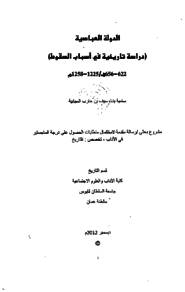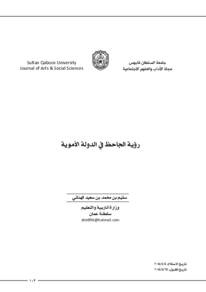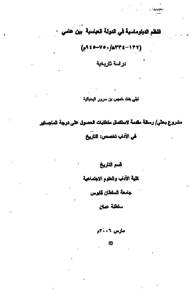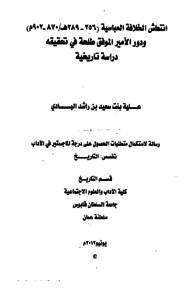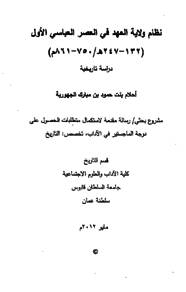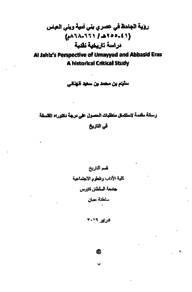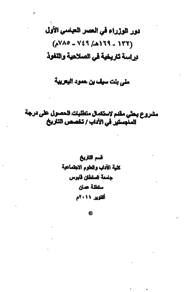Document
الدولة العباسيّة : دراسة تاريخيّة في أسباب السقوط : b 622-656 هـ/1225-1258م
Publisher
جامعة السلطان قابوس
Gregorian
2012
Language
Arabic
Subject
English abstract
The aim of this study is to shed light on the direct and indirect causes that have contributed to weakening the Abbasid State and then fall, and see events in this stage, as the study presents the roles of some characters who have played a prominent role in this stage such as Abbassi almtakhreyen, Ibn alelkomy, Nasiruddin Tusi and some Princes parties. In order to discuss these reasons in a way closer to objectivity, the researcher had relied on primary sources and some modern references, and followed the historical approach based on analysis and extrapolation of some historical novels. This study contains an introduction, preface, three chapters, and a conclusion. The chapters are, Chapter 1 policies last from Abbassi (622-656/1225-1258 m), the second chapter in the impact of the relationship between the Central and the Mashreq States succession, while chapter ill focused on: the emergence of the Mongols on the political scene and the fall of the Abbasid State (656/1258). The study concluded several results for example, know the Abbasid State provisional boom during the reign of the Abbasid Caliph Al-Nasser to the religion of God through system (bully Nasiriyah). Personal weakness ingeniously latecomers and living in luxury led to a role for their comment on a firm grasp of Things in the State and continued competition. Disintegration and Division that experienced the Abbasid State in late days led to the Independence of many States such as algorithm and Ayyubid and Ismailia lawn, Doctrinal and sectarian conflicts have had a prominent role in weakening the Abbasid State constant rivalry between doctrines, especially Sunni and Shiite which has undermined the Abbasid State body inside and force the enemy. Experienced by the Islamic world in General and the Abbasid State in particular were known for Moguls events and cruelty as the Abbasid State could face this enemy, Conflicting views of historians about cases of alelkomy Minister agreement with Mongols to drop the Abbasid State and Nasiruddin Tusi motivated the Mongols to drop the Abbasid State. Also Fear of the Lords from the Mongols and their desire to preserve their property was pushing them to provide obligatory obedience and allegiance to the Mongols and assist them in the Elimination of the Abbasid State. At the end the physical loss, social and scientific to the Islamic world after the fall of the Abbasid State in the hands of the Mongols.
Member of
Resource URL
Arabic abstract
هدفت هذه الدراسة إلى إلقاء الضوء على الأسباب المباشرة وغير المباشرة التي ساهمت في إضعاف الدولة العباسية ومن ثم سقوطها، ومعرفة الأحداث التي تخللت هذه المرحلة، كما وتعرض الدراسة أدوار بعض الشخصيات التي كان لها أثر كبير في مجريات الأحداث مثل الخلفاء العباسيين المتأخريين، وابن العلقمي، نصير الدين الطوسي، وبعض أمراء الأطراف. ولكي يتم مناقشة هذه الأسباب بطريقة أقرب للموضوعية، فإن الباحثة اعتمدت على المصادر الأولية وبعض المراجع الحديثة، واتبعت المنهج التاريخي القائم على التحليل والاستقراء لبعض الروايات التاريخية. وتحتوي هذه الدراسة على مقدمة، وتمهيد، وثلاثة فصول، وخاتمة. والفصول هي: الفصل الأول: سياسات الخلفاء العباسيون الأواخر (622 656/ 1225-1258م)، اما الفصل الثاني فتخصص في: أثر العلاقة بين الخلاقة المركزية ودويلات المشرق، بينما ركز الفصل الثالث على ظهور المغول على المسرح السياسي ومقوط الدولة العباسية (656ھ/1258م). وقد خلصت الدراسة إلى نتائج عدة منها: عرفت الدولة العباسية فترة الازدهار المؤقت في عهد الخليفة العباسي الناصر لدين الله وذلك من خلال نظام (الفتوة الناصرية). ضعف شخصية الخلفاء العباسيين المتأخرين وعيشهم في حالة ترف أدى إلى ظهور دور لحاشيتهم في الإمساك بزمام الأمور في الدولة والتنافس المستمر بينهم. التفكك والانقسام الذي عاشته الدولة العباسية في أواخر ايامها أدى إلى استقلال الكثير من الدويلات عنها مثل الخوارزمية والأيوبية والإسماعيلية الحشيشية. الصراعات الطائفية والمذهبية كان لها دور بارز في إضعاف الدولة العباسية فالتنافس المستمر بين المذاهب وخاصة المذهب السني والشيعي أدى إلى تقويض جسم الدولة العباسية من الداخل. قوة وشدة العدو الذي واجهه العالم الإسلامي عامة والدولة العباسية خاصة فقد غرف عن المغول الشدة والقوة ولما تستطع الدولة العباسية أن تواجه هذا العدو. تضارب وجهات نظر المؤرخين حول قضية مكاتبة الوزير ابن العلقمي للمغول لإسقاط الدولة العباسية، لعب نصير الدين الطوسي دورة تحفيزية للمغول في القضاء على الدولة العباسية، خوف أمراء الأطراف من المغول ورغبتهم في المحافظة على ممتلكاتهم كان دافعا لهم في تقديم فروض الطاعة والولاء للمغول ومساعدتهم في القضاء على الدولة العباسية. الخسارة المادية والاجتماعية والعلمية التي لحقت بالعالم الإسلامي بعد سقوط الدولة العباسية في بد المغول.
Category
Theses and Dissertations

